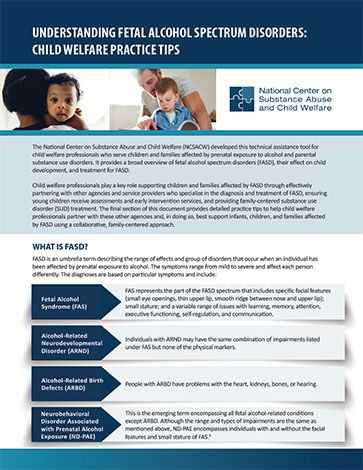Infants
The well-being of infants with prenatal substance exposure improves with early identification and developmental interventions. These resources provide information on the needs of infants who have been affected by parental substance use.
Highlighted Resource
Understanding Fetal Alcohol Spectrum Disorders: Child Welfare Practice Tips

National Center on Substance Abuse and Child Welfare, 2022
Provides an overview of fetal alcohol spectrum disorder (FASD); the effect of FASD on child development; FASD treatment; and child welfare
...(Read More)Policy and Practice Resources
Understanding Fetal Alcohol Spectrum Disorders: Child Welfare Practice Tips
National Center on Substance Abuse and Child..., 2022
Provides an overview of fetal alcohol spectrum disorder (FASD); the effect of FASD on
... (Read More)Understanding Fetal Alcohol Spectrum Disorders for Substance Use Treatment Professionals
National Center on Substance Abuse and Child..., 2022
Designed for substance use treatment professionals who serve: 1) parents with alcohol
... (Read More)ASTHO Brief: Stigma Reinforces Barriers to Care for Pregnant and Postpartum Women with Substance Use Disord...
Association of State and Territorial Health ..., 2019
Examines how to overcome barriers for pregnant and postpartum women with SUDs seeking
... (Read More)US Surgeon General’s Advisory: Marijuana Use and the Developing Brain
U.S. Department of Health and Human Services, 2019
Former U.S. Surgeon General Jerome Adams discusses the risks of marijuana use during
... (Read More)Opioid Safety Toolkit: Emerging Treatment Options for Neonatal Abstinence Syndrome
California Healthcare Foundation, 2019
An infographic comparing the standard of care with emerging models for treating
... (Read More)HRSA’s Home Visiting Program: Supporting Families Impacted by Opioid Use and Neonatal Abstinence Syndrome
Health Resources and Services Administration, 2018
A guide for Maternal, Infant, and Early Childhood Home Visiting (MIECHV) awardees
... (Read More)Clinical Guidance for Treating Pregnant and Parenting Women With Opioid Use Disorder and Their Infants
Substance Abuse and Mental Health Services A..., 2018
Provides comprehensive national guidance for optimal management of pregnant and
... (Read More)The Neonatal Abstinence Syndrome Framework
Association of State and Territorial Health ..., 2017
Provides a framework to help structure stakeholder discussions at the state level to
... (Read More)Related Online Training, Videos, and Webinars
A Mother-Centered Approach to Treating Neonatal Abstinence Syndrome
Date: January 07, 2021
Focuses on how doctors modified the care of infants with NAS and reduced their average length of stay in the hospital by transitioning
...(Read More)State and Local Examples
Florida Neonatal Abstinence Syndrome (NAS) Tool Kit: A Quality Improvement Initiative
Florida Perinatal Quality Collaborative, 2019
Offers guidance to hospitals and neonatal providers in the development of
... (Read More)Hospital Checklist for Adoption of the Eat, Sleep, Console NAS Assessment Items
Colorado Hospital Substance Exposed Newborns..., 2018
Provides hospitals with steps to implement the Eat, Sleep, Console method.
... (Read More)Non-Pharmacologic Care for Substance-Exposed Newborns
Colorado Hospital Substance Exposed Newborns..., 2018
Provides health care professionals with strategies as they standardize non
... (Read More)Ohio Mental Health and Addiction Services FASD Webpage
Ohio Department of Mental Health and Addicti..., n.d.
Offers an overview of FASD along with resources, training, and learning modules.
... (Read More)SAFEST Choice
Boston Medical Center, n.d.
Features a learning collaborative seeking to reduce the incidence of prenatal alcohol
... (Read More)Additional Resources
Partner with Mothers to Seek and Support Recovery Post Prenatal Opioid Exposure
American Academy of Pediatrics, 2019
The infographic outlines fundamental opportunities presented to pediatricians when
... (Read More)Substance Use During Pregnancy and Plans of Safe Care (POSC): Implications for Pediatricians, Mothers, and ...
American Academy of Pediatrics, 2019
The factsheet answers core questions asked by pediatricians with respect to POSC
... (Read More)Treating Babies Who Were Exposed to Opioids Before Birth: Support for a New Beginning
Substance Abuse and Mental Health Services A..., 2018
Provides information about NAS as well as Do’s and Don’ts for responding to infant’s
... (Read More)